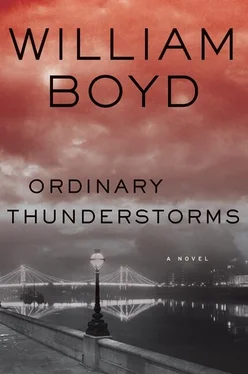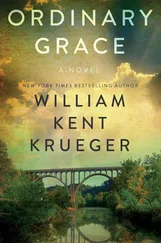The itch around his jaw, throat and lips was just one amongst the many itches that dominated his waking life. He hadn’t stepped under a shower or into a bath since he had prepared himself for his interview at Imperial College. And here was another admixture of pride and regret: to learn from the newspapers that it had been decided to offer him the job of senior research fellow was gratifying (he was the perfect, well-qualified candidate) but then only to have the offer withdrawn hours later — once he was a publicised murder-suspect — was a blow, however predictable. He had kept his phone switched off but wondered if anyone had called: Imperial College, offering the job, then withdrawing it? The police — urging him to give himself up? He was unwilling to use his phone in the triangle — uncertain whether it might give his position away and keen to conserve whatever juice was left in the battery — he was down to one bar. It had all gone quiet for the last forty-eight hours, however. But he found he didn’t care as much as he thought he would about the job, such were the incremental complexities and disasters of his strange new life underground. He would rather have a thirty-minute soak in a hot bath, currently, than be a senior research fellow at Imperial College — it was some measure of the waking nightmare his life had become.
He washed as well and as much as he could in public lavatories — he could just about manage hands, face and neck — but his hair was now heavy and dull with grease (in his other life he had washed his hair every day — what a preposterous luxury that seemed) and his clothes were taking on that encrusted, creased look of the homeless, adhering loosely to the body-shape like a fabric integument, another skin. He slept and lived in the same shirt, underpants and trousers and he knew he was beginning to smell as he steadily acquired that unmistakable look — of poverty, of self-neglect.
As he roved around his triangle at night — easily avoiding the occasional drug-takers and the lovers who took advantage of its dark undergrowth for some moments of privacy — he had become aware that, at low tide, a long, thin sand and shingle beach appeared below the sheer embankment wall. Three looped rows of chains had been attached, one above the other, to this wall, as a safety aid, he supposed, something to grab on to if you found yourself in the river being washed up- or downstream, depending on the powerful tides. These chains also allowed him to descend easily to his beach, a thing he had done twice now, and the first time he had done so, at about two in the morning, he had felt an overpowering temptation to strip off, immerse himself in the river and wash himself clean. But the tide was still ebbing and he could sense its tremendous flow and strength: he didn’t yet know the river well enough, he realised. Perhaps the only minutes he could safely wade in would be when the tide was turning and the rush of water slowed or slackened for a few moments. As he clambered back up to the triangle, hauling himself up the chains, he was pleased to think that he would have a beach now, twice every twenty-four hours — the river was becoming a feature of his tiny triangular world.
He lay low in the day, stretched on his groundsheet in the shade of the bush, listening to the traffic grind by on the four lanes of tarmac just a few feet away, thinking endlessly about what had happened to him and making plan after plan for any number of potential futures. He watched the clouds travel above the Thames, idly noting their types and transformations. One day he saw the sky cover steadily with a thin layer of altostratus translucidus, the sun a shrouded, nacreous disc, and, as the cloud-layer inevitably thickened to altostratus opacus, he sensed the rising moisture gathering ahead of an advancing warm front and, two hours before the inevitable rain began to fall, he prepared and waterproofed his sleeping quarters under his bush as best he could. He lay in his makeshift tent hearing the tapping patter of rain and felt, not pride at his expertise and manifest foreknowledge, but sadness. Clouds were his business — he was a cloud-man who made clouds in his giant laboratory and stimulated them to deliver their moisture in the form of raindrops or hailstones…So what was he doing lying, filthy and alone, in this small triangle of ground on the bank of the Thames? Not for the first time the life that he had once so recently led seemed some kind of taunting chimera — the contrasts between his two existences, before and after, appeared too acute to seem real — as if the Adam Kindred he had been was a fantasy figure, a vagrant’s dream, the fond imaginings of a desperate down-and-out.
These moods passed and when they did so, late at night, when it was dark and the tide was low, he climbed down the wall-chains on to his small beach and retrieved what bounty the river brought him: three rubber tyres that he stacked on top of each other and used as a seat, a battered wooden fruit box, in which he kept his cooking utensils, and a traffic cone — somehow he thought it better that it wasn’t on the beach where it might draw attention to itself. When he was hungry he went out and, with his dwindling supply of money, bought sandwiches and hot drinks in cheap cafes and fast-food franchises where his shabby, dingy appearance attracted no surprised looks. With the aid of his small street-map paperback he familiarised himself with his neighbourhood in South — west London. He followed the progress of the Wang murder investigation in discarded newspapers and he sensed, even after a few days, how it was quickly ceasing to be a long-running story. The advent of the reward-announcement had changed all that, however, provoking another surge of interest in him and wild speculation on the uncanny ‘disappearance’ of the prime suspect: had he committed suicide, had he fled abroad, was he being sheltered by some misguided friend or family member?…
He had read of his father’s emotional televised plea that he surrender himself to the police, hugely grateful that he hadn’t actually seen it. “Give yourself up, son, you’re only making things worse. We know you’re innocent. Let’s sort out this horrible mistake.” He read that his ex-wife Alexa Maybury Kindred had declined to comment, though the details of his divorce (and its adulterous catalyst) were surprisingly accurate. As he read, and as each day went by, Adam was alarmed to note that no other suspect was listed, no other scenario of Wang’s death mooted, and he began to ask himself if, by deciding to go underground, he had made not only the most important decision of his life but also the biggest mistake — a life defined, he now thought in his depressed state, by a catalogue of errors that had led him inexorably to this one. Only he, he realised, knew about the man on the balcony; only he could testify to the fact that Philip Wang had had a breadknife in his chest when Adam opened the bedroom door; only he had confronted the man with the gun at the rear of Grafton Lodge…
He had to do something, he thought glumly, looking at his watch. Crouching, he scurried over to a nearby laburnum bush and peeled back a rectangle of turf. This was where he had buried his cash-box, a dry, secure hiding place where he could leave his few precious possessions — his wallet, credit cards, his A — Z street map, mobile phone and the file he had tried to return to Wang. It was this dossier he was interested in now — an interest triggered and heightened by the announcement of the reward. He had looked at it before a couple of times, trying vainly to decipher what its importance was, but now the advertisement had appeared it seemed even more crucial, somehow. What was this firm Calenture-Deutz and why was Philip Wang so important to them? Why were they prepared to pay so much money to find Adam Kindred?
Читать дальше












